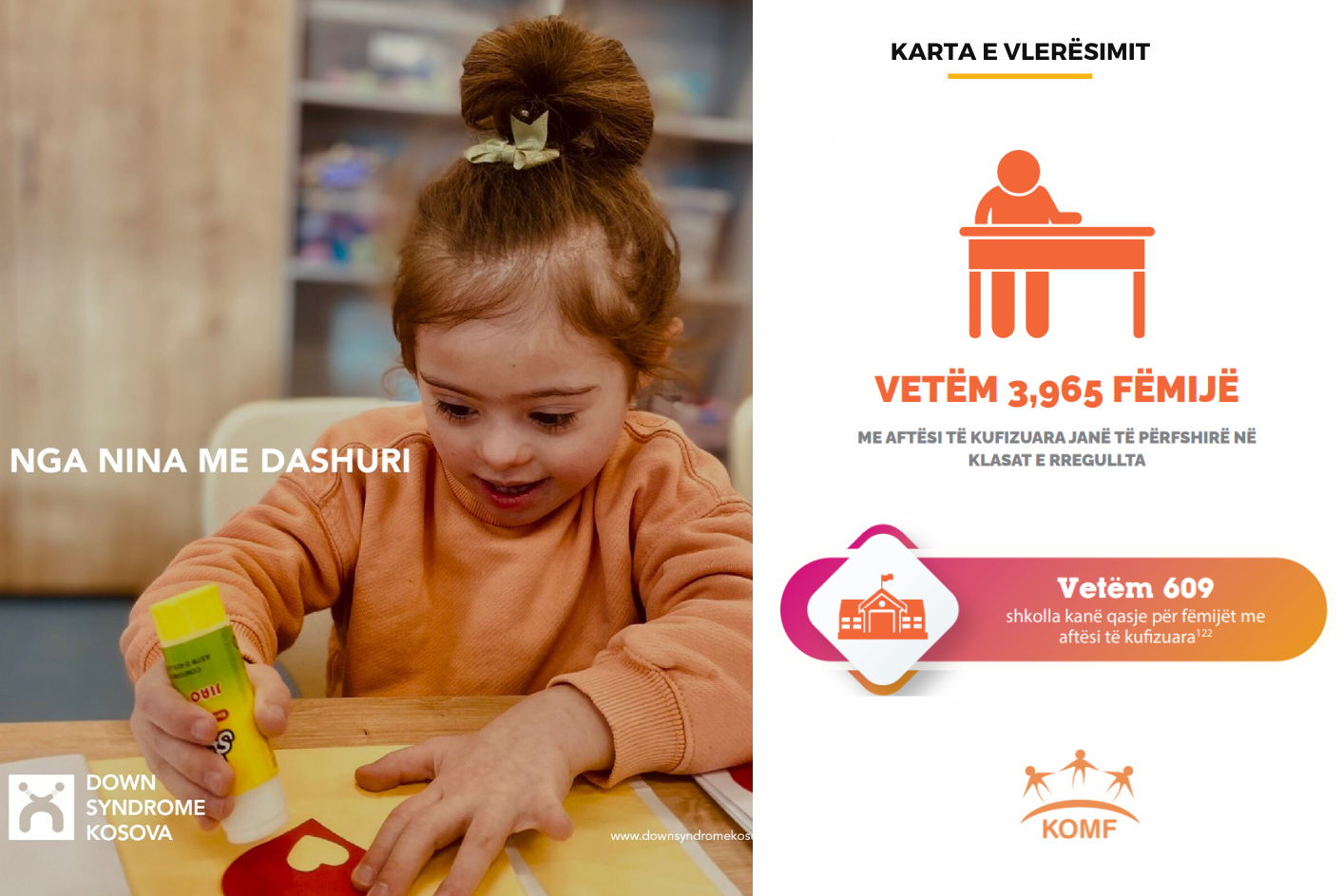
Integration and inclusion of children with disabilities remains a challenge for Kosovo
Children with disabilities in Kosovo face numerous challenges regarding inclusion in education, access in health and social services, access to institutions and the community, etc.
In Kosovo, the right to material assistance for children with disabilities is defined as a protection element for this category. However, the Law on Material Support for Families of Children with Permanent Disability does not guarantee a comprehensive protection for all children with disabilities, but recognizes the right to material compensation only for children with permanent physical, mental and sensory disabilities, who are completely unable to perform the daily life activities without receiving care from another person. This law provides support for only approximately 3,000 children with disabilities, excluding the vast majority of children with disabilities. Therefore, it discriminates and does not cover all children with disabilities. Furthermore, the financial support in the amount of 100 euros offered to children and their families, is insufficient for children with disabilities needs.
Early childhood care and education is even more important for children with disabilities. Services for early identification and intervention are inexistent. Although it is set by law that every municipality must have municipal teams for the assessment of children with disabilities, often these children are identified only when they reach school age and try to enroll in schools, time when the intervention is already too late to have a sustainable influence on their development. In 2021/2022, 45 children with disabilities (1-6 years old) were included in resource centers/special schools. 511 children with disabilities (1-6 years) were included in regular classes. However, official data show that data on children with disabilities and the accuracy of this data are complex due to the fact that not all children with disabilities have been assessed. This is because, in most municipalities, commissions for assessment of children with disabilities are only formally established, but they are not functional.
In Kosovo, steps have been taken in the advancement of policies and legislation, attempting to include the concept of inclusiveness as an integral part of all policies. However, in terms of implementing policies and developing mechanisms that ensure inclusiveness, there is still much work to be done. Only 3,965 children with disabilities are included in regular classes. Inclusion of children with disabilities in schools is not significant and based on children’s individual needs. The integration of children is even more difficult by the lack of professional and supporting staff, such as assistants for children with disabilities, psychologists, and teachers in schools. The employment of 100 assistants for children with disabilities, was a positive action in 2022, however this number is not enough for covering all children’s needs.
Inclusive education is possible when parents of children with disabilities have the right information and support. Support for parents and extent of services for them is low, fragmented, mostly limited and mainly supported from civil society organizations initiatives. Without services at local level, many families feel unable to support their children’s psychosocial development, rehabilitation at home and their inclusion in schools and in the community.
Regarding access for children with disabilities, out of a total of 1094 school institutions, 609 schools have access for children with disabilities.
Mostly, professional services for children with disabilities are provided by the non-governmental sector, and the main challenge is lack of services sustainability. Approximately 30 Day Care Centers for children and adults with disabilities have provided social services on daily basis for early intervention for children with disabilities, psychosocial, rehabilitation and counseling services and services to empower parents of children with disabilities. These services have mainly remained under the support of foreign agencies and donors, while state support remains very limited. The unstable nature of providing these services minimizes the full inclusion of children with disabilities and limits the long-term rehabilitation plan needed to help children with disabilities to reach their full potential.
Recommendations:
- Adopt the new legislation for the recognition of the status, assessment and support for all children with disabilities;
- Establish or operationalize commissions for the assessment of children with disabilities;
- Greater inclusion of children with disabilities within preschool and educational institutions;
- Increase the number of support assistants for children with disabilities as foreseen in the legislation;
- Ensure financial sustainability of services for early intervention for children with disabilities, psychosocial, rehabilitative and counseling services and services for empowering parents of children with disabilities;
- Remove obstacles in order to ensure accessibility for children with disabilities in educational institutions;
- Research and determination of the exact number of children with disabilities.

Recent Comments